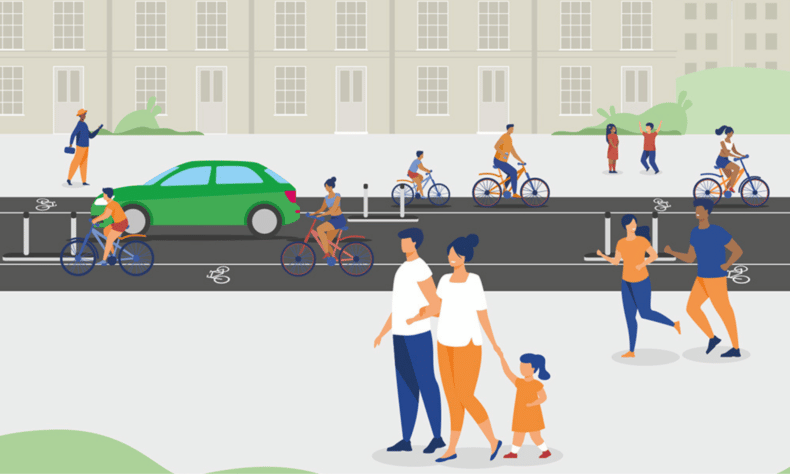Schemes to improve walking and cycling routes in Bath using £500k of government funding, made available to encourage more active travel, will be consulted on by Bath & North East Somerset Council.
The council today (Monday 22 February) launched its consultation for two proposed schemes which could see cycling and pedestrian improvements to A4 Upper Bristol Road and from the city centre to Bath University along North Road using Active Travel funding.
An additional improvement scheme from Combe Down to Bath University is also being consulted on. This is funded separately from the council’s Transport Improvement programme.
Active Travel funding was launched in May 2020 by the Department for Transport in response to Covid-19 as the country came out of the first lockdown. Its first tranche of funding was used by the council for temporary highway schemes to aid social distancing and help enable more journeys to be taken by walking and cycling by reallocating road space.
A second tranche of funding was made available for permanent schemes focused on providing an alternative for journeys that people may previously have been taken on public transport and also to help enable more people to walk and cycle for short, local trips.
Through the West of England Combined Authority (WECA), the council submitted a successful bid to the Department for Transport for Active Travel funding. It is now consulting on the following schemes:
- The A4 Upper Bristol Road scheme proposes to install new cycle lanes that are separate from motor traffic, between Midland Road and Charlotte Street. Road crossings will be prioritised for those on foot, a section of on-street parking bays will need to be removed and some of these will be re-provided nearby.
- The Bath city centre to University of Bath scheme proposes a new continuous cycle route using new cycle lanes separated from motor traffic along Beckford Rd, an experimental closure of North Road as well as off-road cycle lanes. Some on-street parking will need to be re-provided nearby.
- The Combe Down to University of Bath scheme proposes to provide safe and convenient pedestrian and cycle crossings on both Bathwick Hill and Widcombe Hill at their junctions with Copseland.
Future improvements are planned that would link with these proposals as part of wider plans to provide better continuous cycle routes and give more priority to people walking and using public transport.
Councillor Joanna Wright, joint cabinet member for Transport Services, said:
We have been awarded £500,000 government funding which is coming through the West of England Combined Authority to be spent on Active Travel routes. If we don’t use our share of the money by March 2022, we will lose it and so we are proposing the three schemes.
According to the National Travel Survey, in 2017-18 more than 40% of urban journeys were under two miles – perfectly suited to walking and cycling.
We think these schemes provide an opportunity to improve facilities encouraging us all to be less reliant on our cars and making it more convenient and safer for local walking and cycling trips, helping us to keep healthy. In the longer-term schemes such as these contribute to our goals of cleaner air and addressing the climate emergency.
The council is inviting views from people who live, work and travel in these areas. The proposed schemes are here and the consultation runs from 22 February until 21 March. Due to Covid-19 restrictions the council has adapted its consultation to online methods, so you can see proposals and provide feedback on proposals safely.
Once the consultation responses have been reviewed we will publish a summary of these on the website. If a decision is made to proceed further, we will use the responses to inform the project design and then advertise the Traffic Regulation Orders, where there will be another opportunity to comment on the final proposals. If given the go ahead, the schemes are expected to be implemented by the end of March 2022.
